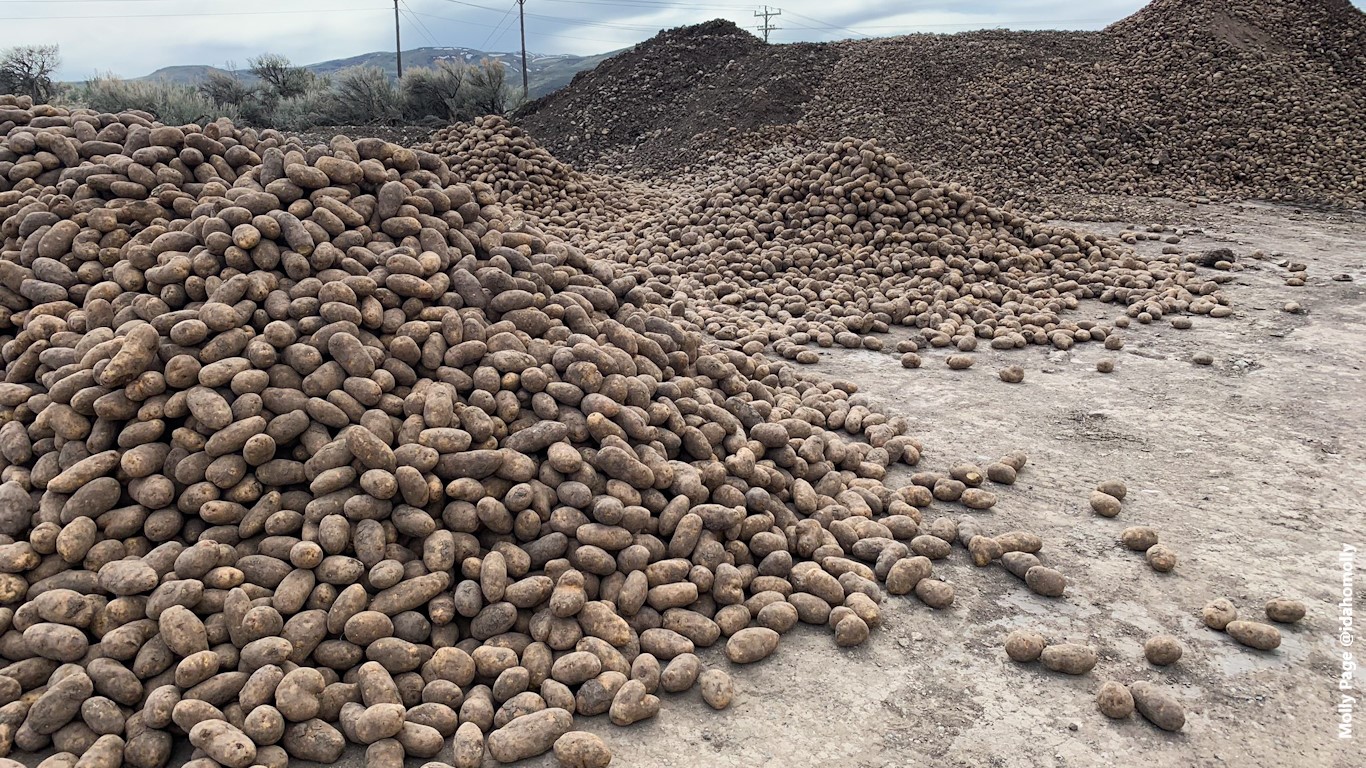Even as food banks nationwide are inundated with hungry Americans, many of the country’s farmers are dumping or destroying their harvests. Amidst a pandemic that has seen tens of millions of workers laid off, the nation’s food banks have struggled to cope with the surge in demand for their vital services.
In San Antonio, over 10,000 people lined up overnight in their vehicles in the hope of receiving a box of basic foods. “Needs have skyrocketed not just here but around the country,” one Washington, D.C. organizer told MintPress last week. Meanwhile, a veteran Louisiana food bank employee said the current situation is graver than it was after Hurricane Katrina. Food banks are going millions of dollars over budget trying to keep up with surging demand; one estimate suggests that one in three people seeking groceries at pantries last month had never done so before. Those who manage the facilities are worried that they will soon be completely drained of food.
Yet even as hunger rises, economics dictates that farmers across the country are dumping, discarding, or failing to harvest vital foods. Dairy farmers are pouring rivers of fresh milk down the drain every day. Pig farmers are slaughtering piglets en masse. Meanwhile, ripening fruits and vegetables are being left to wither and die on the vine or in the ground. The reason? “Demand” is falling greatly.
Of course, during a pandemic, the caloric needs of America are basically the same as before: we have all got to eat. The problem is that so much of the produce was predestined to be bought by businesses that have now closed due to the lockdown. Restaurants, universities, hotels, stadiums and many more popular eating locations are now shuttered, leading to a collapse in orders for many farmers. At the same time, there is an increased demand for supermarkets and food banks, leading to a situation where farms are full, but store shelves and bellies are increasingly empty. Re-routing interrupted supply chains is not easy, and many farms have not found new buyers willing to collect, transport and distribute their food.
A perfect encapsulation of this is an Idaho woman who went to her local farm yesterday and saw mountains of discarded potatoes, given away free to anyone who passed. Yet three days earlier she noted that her local food bank had fed more people in the last four weeks than it did in the whole of last year. Unfortunately, the current system is currently unable to make those ends meet.
Farmers in Idaho are dumping their potatoes.
I went to Picabo today to see the discarded pile (and pick up a bagful). Commercial demand has fallen, and there is no market for the extra potatoes.
pic.twitter.com/7MLLeIigmC
— Molly Page (@idahomolly) April 23, 2020
Marion Nestle, Paulette Goddard Professor, of Nutrition, Food Studies, and Public Health, Emerita, at New York University and author of the influential book Food Politics: How the Food Industry Influences Nutrition and Health, explained the situation to MintPress News:
Of all of the contradictions and deep flaws in our food system, none is a more poignant example of its lack of resiliency than food dumping in the face of long lines of cars waiting hours for food handouts. The last time we saw this was in the Great Depression of the 1930s. Then, the government stepped in with assistance programs for farmers and hungry people — that’s how the Food Stamp program (now SNAP) got started. But today’s government has done all it can to weaken SNAP and bailout funds largely go to Big Agriculture, not small farmers. The only hope is that public pressure will force the government to step in and intervene in some positive way. I see signs of useful actions — increased SNAP benefits, for example — but will they last? One can only hope.”
Some of the hotspots of the COVID-19 outbreak are also in areas of most pressing food insecurity. This is rarely a coincidence. The South Bronx, for example, is the most food insecure community of the United States: some 37 percent of residents regularly going hungry. Bronx residents are over twice as likely to contract coronavirus as their much wealthier Manhattan neighbors. Those who live in poverty often have neither the accommodation nor the economic means to shelter in place like others can. Furthermore, 32 percent of the Bronx works in education, healthcare or social assistance, meaning their jobs cannot be done from home.
The coronavirus pandemic is currently shaking America’s food supply and production system. And after only a few weeks, it appears much of it is failing the stress test.
Feature photo | Discarded potatoes lay near an Idaho roadside, dumped by a farmer unable to sell them amid the coronavirus lockdown. Photo | Molly Page @idahomolly
Alan MacLeod is a Staff Writer for MintPress News. After completing his PhD in 2017 he published two books: Bad News From Venezuela: Twenty Years of Fake News and Misreporting and Propaganda in the Information Age: Still Manufacturing Consent. He has also contributed to Fairness and Accuracy in Reporting, The Guardian, Salon, The Grayzone, Jacobin Magazine, Common Dreams the American Herald Tribune and The Canary.
The post As Food Banks Struggle to Cope with Demand, Desperate Farmers Dump Unsellable Produce appeared first on MintPress News.
